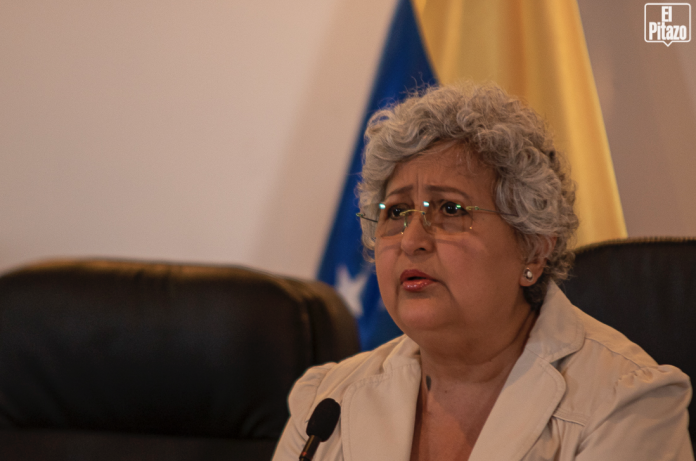The fourth electoral political monitoring report “Unid@joserafaels Por La Democracia” (United for Democracy) compiles the most important publications and actions registered in October 2020 on the topics of the parliamentary elections scheduled for December 6 as well as the consultation called by the National Assembly
TRUST IN THE VOTE IS ESSENTIAL TO ENSURE MORE PARTICIPATION IN THE ELECTORAL PROCESS
The Asamblea de Educación Electoral Observation Network warned about the measures adopted by the National Electoral Council (CNE) and other organs such as the Supreme Tribunal of Justice, that move away from the constitutional mandate to increase citizen mistrust regarding the electoral process. The election of the National Assembly (AN) on December 6 should entail the challenge of surpassing the participation levels of the 2010 and 2015 elections, which stood at 66% and 74% respectively. Read here about the circumstances that have surrounded the process since its beginning last July, and that risk eroding the participation numbers on the voting day, according to the Electoral Observation Network.
GENDER PARITY IS A PENDING TASK IN VENEZUELA
In Venezuela, despite the existence of several CNE resolutions and laws contemplating gender parity, coupled with a Constitution that establishes the exercise of rights and freedoms under conditions of equality; Significant gaps persist that keep women on the sidelines of the country’s political affairs and decision-making spaces. The review of the list of candidates published by the CNE shows that only 3 out of 26 political parties met the parity criteria. READ MORE HERE.
ACCESO A LA JUSTICIA DENOUNCED BEFORE THE IACHR A CUSTOM-MADE PARLIAMENTARY ELECTION
The parliamentary elections scheduled for December 6 are designed to favor the Government of Nicolás Maduro and harm his adversaries. This was denounced by Acceso a la Justicia to the Inter-American Commission on Human Rights (IACHR) through a report detailing the implications of the changes that the Supreme Tribunal of Justice (TSJ) and the National Electoral Council (CNE) made to the Venezuelan electoral system in recent months. According to Acceso a la Justicia, the “mutation” suffered by the electoral system is “yet another example of the lack of independence” of the highest court, in particular the Constitutional Chamber. READ MORE HERE.
VOTO JOVEN held the second session of OKO: Meetings for political understanding
On October 22, Voto Joven held the second session of OKO: Meetings for Political Understanding, where youth representatives from six political parties were invited to discuss the options for citizen participation in Venezuela. To watch the recording of the event click here.
UPS AND DOWNS OF THE 2020 ELECTORAL SIMULATION
The Venezuelan Observatory on Elections (OEV) deployed its national network of independent electoral observation during the day of the first national voting simulation held on October 25 in anticipation of the December parliamentary election. 351 observers across the 23 states and the Capital District attended the event and recorded their impressions. In general terms, 51% of the OEV observers rated the simulation as good; 27% perceived it to be fair and 13% found it excellent. 9 out of 10 observers agreed that the voting machine did not present any failure or problem, and more than half (57%) of the network witnessed public resources being employed to transfer voters to the polling centers. On this occasion, 381 voting centers were selected throughout the country. In comparison, this meant a reduction in the number of centers available to voters: for the simulation of the 2015 parliamentary elections, 749 centers were enabled, whereas 500 centers were made available for the 2018 presidential election simulation. The fewer centers, the more likely overcrowding will be. READ MORE HERE.
THE NATIONAL ASSEMBLY APPROVED AN AGREEMENT TO PROMOTE A POPULAR CONSULTATION
The National Assembly convened a consultation where all Venezuelans “eligible to vote”, inside Venezuela and abroad, will be able to express their opinion on two questions: one in rejection of the December 6 elections, and the other to ask for free, fair, and verifiable presidential and parliamentary elections. READ MORE HERE.
THE EU WILL NOT RECOGNIZE THE RESULTS OF THE PARLIAMENTARY ELECTIONS IN VENEZUELA DUE TO LACK OF LEGITIMACY
The head of the French Foreign Ministry, Jean-Yves le Drian, indicated on October 21 that the European Union does not recognize the electoral process for the legislative elections of December 6 in Venezuela, after having failed in its attempt to convince the Maduro government to postpone the elections. READ MORE HERE.
THE ELECTION MONITOR
The Election Monitor is a joint initiative promoted by Observatorio Global de Comunicación y Democracia (The Global Observatory on Communication and Democracy – OGCD) and Centro de Justicia y Paz (Center for Justice and Peace – CEPAZ), within the context of the follow-up and monitoring of the 2020 parliamentary elections in Venezuela. The publication aims to provide precise and pertinent information every week regarding the development of the different phases of the process by the National Electoral Council (CNE). It will also include relevant information on the actions and proposals developed by Venezuelan civil society organizations concerning the aforementioned electoral event.
Click here to read issue # 16.
Click here to read issue # 17.
Click here to read issue # 18.
ASOSABER HELD A CHAT FORUM ON OCTOBER 7 ON ELECTORAL ACCOUNTABILITY WITH THE SUPPORT OF CARACAS CIUDAD PLURAL
Accountability refers to the process in which all citizens monitor and evaluate the behavior of public servants through mechanisms such as transparency and oversight, to avoid abuse of power. It is currently considered a necessary mechanism for the functioning of democracy and the fight against corruption. For this reason, on Wednesday, October 7, AsoSaber and Caracas Ciudad Plural (Caracas Plural City) held a second chat forum through WhatsApp. The speaker this time was Carmen González, lawyer, sociologist, and president at AsoSaber, who started her dissertation with the question “What is Accountability?”. She explained accountability is a system that allows individuals running for office and political organizations to register the information about the funding of their electoral campaign on the National Electoral Council’s website. This possibility arises from the constitutional mandate of the Electoral Power to issue guidelines on political-electoral financing and advertising, as well as to apply sanctions in case of non-compliance, as established in Articles 293.3 and 293.9. On the other hand, Articles 33, clauses 23, 24, and 25 of the Organic Law on the Electoral Power gives the CNE competence in this matter. READ MORE HERE.
THE PARLIAMENTARY POLLS ARE AN EXAMPLE OF EVERYTHING THAT SHOULD NOT HAPPEN IN AN ELECTION
Since the rushed appointment of the board of directors of the National Electoral Council (CNE) by the Supreme Tribunal of Justice (TSJ) last June, an unhindered electoral race has been promoted in favor of the ruling party. The duet made up of the Judicial and Electoral powers has designed a process contrary to the provisions of the 1999 Constitution and international standards in electoral matters, undoubtedly tailored to the interests of the Maduro regime. Through regulations of sub-legal nature, the disputed CNE board has distorted the 2009 Organic Law on Electoral Processes (LOPRE) by increasing the number of seats in the legislative body by 66%, from 167 to 277 seats, and reducing the number of deputies elected nominally from 70% to 48%. All these changes do not conform to the content of article 186 of the Constitution. READ MORE HERE.
ELECTORAL NEWS IN THE MEDIA
GUACHIMÁN ELECTORAL
ELECTORAL TECHNICIANS: YOU EITHER RUN A FULL AUDIT OR EXPECT UNRELIABLE RESULTS
There are “essential” audits according to the experts: the audit of the voting machines software; the certification of the voter information system software, and the evaluation of the transmission network of electoral results. More than the number of audits, the electoral experts are worried about the key processes during pre and post-election phases that remain undisclosed to date. The new hardware was only presented 58 days before the elections. And the participating political organizations will only be able to see and learn about the new voting system and software a mere 45 days in advance of the voting day, from October 12 to 23. READ MORE HERE.
CRÓNICA UNO
THE NEW ELECTORAL SYSTEM COMPLICATES THE POSSIBILITY OF CROSS VOTING ACCORDING TO EXPERTS
The new voting system that will be used for the parliamentary elections on December 6 would benefit the vote by blocks and would make the option of cross-voting (voting for individual candidates from different political organizations) more difficult, according to experts who have followed the development of the electoral process. Previously, the options for the voter were presented in their entirety, but now it is done in a segmented way, showing all the political parties first, and hiding the candidates. According to Mr. Medina, this is a key aspect. The voter is first shown a list of political parties. Then, if the voter wants to cross-vote, he or she has to select party A to display the candidates and choose candidate 1, then go back to the parties screen, choose party B and then choose candidate 2″ he explained. READ MORE HERE.
EFECTO COCUYO
COMPETENCES OF OBSERVERS REMAIN LIMITED IN THE NEW CNE REGULATION
The National Electoral Council reported on the reform of the Rules of the Organic Law on Electoral Processes (Lopre) to replace the figure of companion for observer. But what seemed to be a substantial transformation in the powers and attributions of the missions that are dedicated to “certifying” the elections, was reduced to a simple change of name. READ MORE HERE.
Translated by José Rafael Medina




